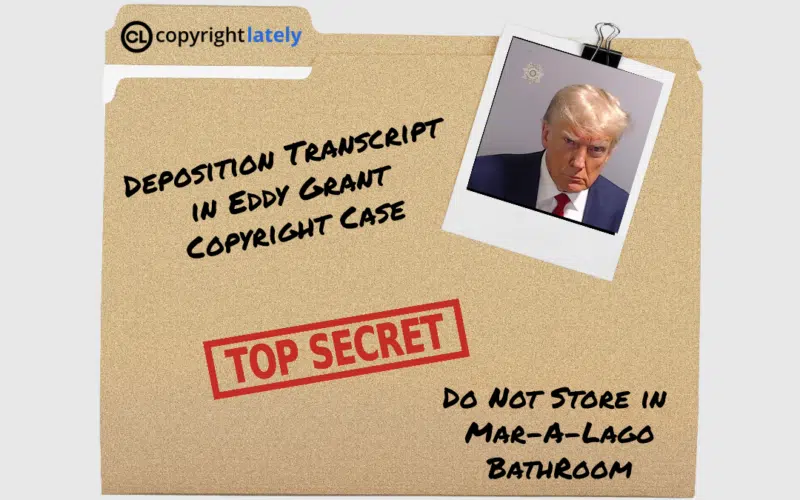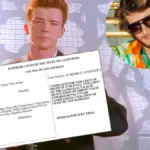Trump is actively litigating a copyright infringement lawsuit over the Eddy Grant song “Electric Avenue” while trying to keep relevant deposition testimony in the case permanently under seal.
For someone accused of treating classified documents with about the same care as old CVS receipts, Donald Trump is going to great lengths to keep his deposition testimony in a long-running copyright infringement case confidential, redacted, and permanently under seal.
I previously wrote about this lawsuit three years ago when musician Eddy Grant first sued Trump over the unauthorized use of his 1983 hit “Electric Avenue” in a 2020 campaign video created by a third party, which was then posted by the former president on his personal Twitter account.

The video features a 40-second snippet of Grant’s song playing over an animated depiction of Joe Biden pushing a handcar while a high-speed Trump campaign train passes. As Biden pumps his handcar along the train track, an excerpt from a nonsensical speech of his (think hairy legs and roaches) plays over Grant’s song. The animation ends with the phrase “BIDEN TRAIN” and the letters of the phrase falling apart.
Why “Electric Avenue” was deemed to be the perfect song to accompany this incredibly ridiculous video is anyone’s guess, but here it is:
What We Know
Fast forward three years and Grant’s lawsuit is still chugging along the tracks. On Friday, the parties finished briefing dueling motions for summary judgment. (Read the moving papers here and here.) Based on the very limited excerpts of Trump’s June 9, 2022, deposition released this month (read here), we learn that Donald Trump claims to have a basic understanding of copyright law, says that he’s never heard of Eddy Grant or “Electric Avenue,” and hasn’t seen a copy of Grant’s complaint or his own answer in the lawsuit.
Trump posted the campaign video featuring Grant’s song on his personal Twitter account, which at the time had over 100 million followers. So naturally, Trump was asked during the deposition about his Twitter habits. The former president testified that he didn’t have much time to look at his Twitter feed because he was “trying to keep Russia from going into Ukraine successfully and other things.”
11· · · · Q.· ·Would it be fair to say that you looked at
12· ·your Twitter feed at least once a day during your
13· ·presidency?
14· · · · · A.· ·Yeah, it would be — again, I didn’t have very
15· ·much time.· I was trying to keep Russia from going into
16· ·Ukraine successfully and other things.· So I didn’t have a
17· ·lot of time to be doing that.
Trump also wondered aloud why Grant didn’t sue the person who actually created the campaign video. It’s not a horrible question, except for the fact that Trump wasn’t the one asking the questions, as Grant’s lawyer made sure to remind the former president during the deposition.
Trump went on to testify that “everybody on the Internet could use [the video] once it was put up.” So much for Trump having a basic understanding of copyright law. As I’ve explained in the Copyright Myth Project, while there are some people who think that copyright laws don’t apply to the Internet, those people are wrong.
14· · · · · Q.· ·Mr. Trump, have either you or any of your
15· ·entities been plaintiffs in copyright infringement
16· ·actions?
17· · · · · A.· ·I don’t know.· Not a big thing, but I don’t
18· ·know.
19· · · · · Q.· ·Okay.· Have you personally ever been a
20· ·defendant in a copyright infringement action?
21· · · · · A.· ·Not that I know of.· I may have been, but a
22· ·lot of things happen.· I don’t know.
Aside from the good ol’ “things happen” truism and an attack on the validity of Grant’s sound recording registration, Trump’s principal defense in the lawsuit is fair use. His lawyers contend that the video’s “whimsical use” of Grant’s song “transformed Grant’s original conception of Electric Avenue as a ‘protest against social conditions’ into a colorful attack on the character and personality traits of a rival political figure.” Unfortunately, it doesn’t appear that the lawyers explained this theory to their client during his 20-minute prep session, as Trump suggested that he didn’t actually know the purpose of his tweet, and he testified that he didn’t think the video had “much of a meaning”:
·7· · · · · Q.· ·What was the purpose of this Tweet or Retweet?
·8· · · · · A.· ·I don’t know what it even represents.· You can
·9· ·hardly hear the music.· The music was very low, and you
10· ·know, it was — it was a political thing.· I guess they
11· ·put it in — you’d have to ask the author.· We did not
12· ·author that, I don’t believe.· This was done by some other
13· ·person and put out on the internet for everybody to use
14· ·and to see.· I don’t think it had any meaning — much of a
15· ·meaning, but you could hardly hear the music because there
16· ·were words over the top of the music that were added by
17· ·whoever — whoever did the authoring.
What We Don’t Know
The real problem isn’t how Trump testified, but the fact that the majority of his transcript has been hidden behind thick black redaction bars, turning the deposition into an incredibly lame version of Mad Libs. The same goes for the testimony of Trump’s 2020 campaign manager Daniel Scavino (read here), which has more redactions than a Florida social studies textbook. To make matters worse, the parties’ pleadings are also redacted, which prevents the public from seeing the precise basis for the key claims and defenses in the case.
Among other things, the defendants’ justification for using Grant’s work is particularly relevant to fair use, especially following the Supreme Court’s recent Warhol decision. While the parties are both relying on the deposition testimony of Trump and Scavino, have fun trying to figure out what these two actually said:

And here’s one for the Pittsburgh fans:

Can Trump Keep All This Stuff Confidential?
Late last month, Southern District of New York District Judge John G. Koeltl ordered the parties to brief the question of whether Trump’s and Scavino’s testimony should be permanently sealed. Those filings have now been completed, along with oppositions and replies in connection with the parties’ cross-motions for summary judgment.
Under the First Amendment, there’s a strong presumption of public access to “judicial documents,” which include documents submitted to a court in connection with a summary judgment motion. The Second Circuit has held that, in light of this strong presumption, “continued sealing of the documents may be justified only with specific, on-the-record findings that sealing is necessary to preserve higher values and only if the sealing order is narrowly tailored to achieve that aim.”
Trump’s Arguments
Through his lawyers, Trump asserts that one such “higher value” is the First Amendment right of political parties, advocacy groups, and campaigns to be free from compelled disclosure of their internal communications and activities. Courts have recognized that these interests extend to the internal communications of campaigns for political office and to political parties. The Trump team argues that the redacted material reveals the “inner workings of President Trump’s 2020 presidential campaign,” and that because he’s running for President again in 2024, forced disclosure could aid rival campaigns.
Trump also contends that details regarding his 2020 Presidential campaign “are, at most, tangentially relevant to the ultimate issues in what is, at bottom, a copyright infringement dispute.”
Grant’s Arguments
Eddy Grant’s lawyers have responded by pointing out that Trump’s 2020 presidential campaign is over, and that while he may be seeking re-election, discussions concerning events that transpired over three years ago don’t pose a risk to current campaign matters. They dispute that the defendants’ redactions reveal the “inner workings” of the Trump campaign, and argue that they instead concern details surrounding Trump’s and Scavino’s use of Twitter, as well as the allegedly infringing tweet at issue in the case and steps that the defendants took to clear copyrighted works in the past.
Grant also claims that the portions of testimony the defendants want to keep hidden aren’t tangential but in fact comprise the very same materials that Grant intends to use to prove his infringement claims.
My Take
I’ve gone on record as saying that Trump’s fair use defense is a loser—and that was at a time when the parties’ judge, John G. Koeltl, had decided the Warhol case in favor of the Andy Warhol Foundation and before Judge Koeltl was reversed by the Second Circuit and ultimately the Supreme Court.
Still, the high court’s recent Warhol decision isn’t particularly helpful to Trump’s cause, because Judge Koeltl has already found in connection with Trump’s unsuccessful motion to dismiss that the video at issue was commercial and that nothing about the use of Grant’s song was integral to the video’s political message. This means that, under Warhol, a “particularly compelling justification” for the use should be needed to establish fair use.
As for the sealing issue, Grant’s lawyers have the better of that argument too. This isn’t a case in which the government is trying to compel an advocacy group to turn over its political affiliations and activities. Trump has voluntarily chosen to defend against a private citizen’s copyright claims rather than admitting liability or reaching a settlement with Grant. In doing so, Trump is denying that he infringed “Electric Avenue,” while at the same time trying to shield the very evidence he claims should permit his defense to go to a jury. He can’t have it both ways.
Of course, that’s just what I think. As always, I’d love to know what you think. Drop me a note in the comments below or on social media @copyrightlately. Meanwhile, here’s a copy of a redacted excerpt from Donald Trump’s deposition transcript. Have fun guessing what he said.
View Fullscreen






